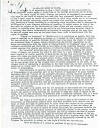| Home See also: The Concept of "Rights"
Although it is impossible to give a short account of the exact extent to which individual rights apply, a little idea of the general principles can be given. The basic rights of "life, liberty, and pursuit of happiness" are necessarily vague on the basis of nothing more than this bare statement. Equality is, not so much a basic right in itself, as a principle by which these rights are to be interpreted. One must definitely reject any notion that equality can carry any meaning justifying a forced levelling by an authority above everybody―this is a most flagrant violation of equality. It rather means, in view of the fact that the subject of the declaration is human rights and not rewards, social position, or anything else, that no one can be by any interpretation accorded rights in a community that cannot automatically be accorded to everyone else at the same time. So that all rights must stop at the point where there would be inference with the rights of another. "Pursuit of happiness" is likewise not to be considered as meaning that everyone is entitled to do anything he pleased or to demand of others anything he pleases. The same principle of equality dictates that it must stop where the rights of others are interfered with. It means, rather, freedom from restrictive regulations in all things not interfering with the rights of others. "Pursuit of happiness" means a very stringent restriction limitation on rights of any authority whatever, and absolves everyone from obeying any dictates of authority violating these limitations. The "equality" principle does not make any statements regarding the capabilities of humans, and arguing the point on that basis is a mere shifting of ground. It means equality of rights, equality of opportunity, and has been expressed "Grant to others all rights you would have others grant to you." Personal guardianship, bossism, etc., common enough under the present social system, really constitute a definite violation of the principle of equality. Likewise, certain rights declared on a class basis by some groups (such as the alleged right of private enterprise on one side, or the alleged rights of unionising or picketing on the other side) are, by this principle, inadmissible as rights under the conceptions as advanced by the Declaration of Independence. Free expression of opinion, while not specifically mentioned in the Declaration of Independence, is an essential part of the "pursuit of happiness." It gains further importance from the "consent of the governed" principle, whereby censored opinions do not constitute real consent, and therefore undermine the basis of existence of any authority whatsoever. The alleged "freedom of press" should be merely interpreted as part of this particular derivative right, not as a special privilege on the part of a particular industry to interfere with any individual's rights. Similarly "freedom of religion" should be taken as part of the free expression of opinion, not as special privilege for churches. The right to do useful work for the community is life itself for most people in a community, and should be so for all in the community where equality is truly respected, any person or group claiming the authority to deny this right to others is morally no different from a deliberate murderer. From this principle is deduced the type of new society advocated. The "right of revolution" is also an important right in the schedule of the Declaration of Independence, indeed basic with that document. It is derived from the basis on which the right of governments to exist rests―the consent of the governed. When anyone's rights are violated by a system of government, or when the consent of the governed ceases to exist or cannot be freely discussed, the government forfeits its rights to existence, and the whole question of authority reverts to the people, to abolishing existing authority by any means available and set up whatever new form of organisation will actually the guarantee the rights of everyone and hold the consent of the governed. It is the rights of every individual, not those of a majority only, that must be guaranteed; the bare principle of "majority rule" is emphatically rejected. The principle is rather, as John Boyle O'Reilly* has expressed it: "That the health of a nation is perilled if one man be oppressed."
AMERICAN INDEPENDENCE SOCIETY ___________ * "John Boyle O'Reilly (1844-1890)―"His death was mourned as the passing of a journalist, orator, patriot, publisher and poet. John Boyle O'Reilly authored many works including four volumes of poems; a novel, "Moondyne", based on his Australian experiences, and collaborated in another novel, "The King's Men". O'Reilly was one of the most prominent journalists of his day promoting the rights of Jews, American Indians and Blacks." Wikipedia See also poem by O'Reilly in America's Search for Liberty in Song and Poem.
|
